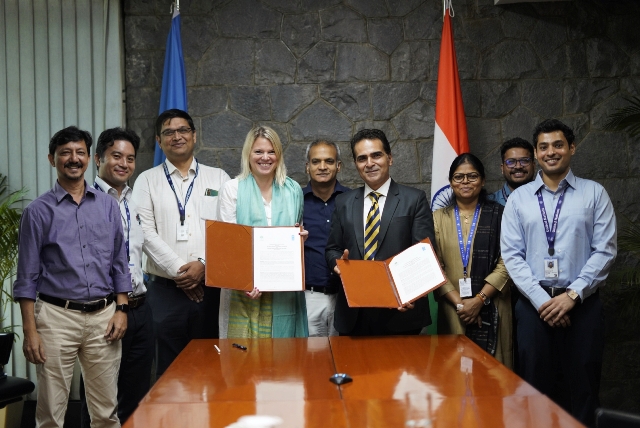
September 13, New Delhi: The United Nations Development Programme (UNDP) and the National Bank for Agriculture and Rural Development (NABARD) signed a Memorandum of Understanding (MoU) to co-create data-driven innovations in agriculture and food systems to support smallholder farmers. Under this MoU, both organizations will work to improve the lives and livelihoods of smallholder farmers by sharing open-source data for product development, transfer of technology and supporting the framing of agrarian policies.
The MoU was signed by Chief General Manager of NABARD, Mr. Sanjeev Rohilla, and UNDP Deputy Resident Representative, Ms. Isabelle Tschan. Under the MoU, UNDP will leverage its expertise in open innovations, data collaboratives, data science approaches and global know-how for supporting NABARD’s agenda of embedding data-driven decision-making in agriculture investments.
The partnership includes enhancing and disseminating collaborative digital public goods like DiCRA (Data in Climate Resilient Agriculture). DiCRA is a collaborative digital public good which provides open access to key geospatial datasets pertinent to climate resilient agriculture. DiCRA, which is curated by UNDP and partner organizations to inform public investments in agriculture, already provides intelligence on climate resilience for 50 million hectares of farmland across India. By partnering for enhancing and scaling its use, NABARD will host and maintain the DiCRA platform and use its key geospatial datasets for policy making, research and development activities, with UNDP’s technical support.
This five-year technical cooperation is envisaged to foster collective climate action, create innovative platforms and new product offerings to enhance economic empowerment in rural India. Speaking on the occasion, Mr Shaji KV, Chairman of NABARD, said, “NABARD is extremely excited about this collaboration with UNDP. This opens a sea of opportunities for the two organizations to leverage data and present it as a digital public infrastructure for the vast rural Indian community of farmers. We are looking forward to deeper ties with UNDP as we progress, and this MoU is a step towards this direction.”
Reaffirming UNDP’s commitment, Ms. Isabelle Tschan, Deputy Resident Representative said, “Agriculture is the largest source of livelihoods in India employing 80% of rural women who are more vulnerable to climate change. DiCRA uses cutting edge data science and machine learning to identify farms that are resilient to climate change and those that are highly vulnerable. Such open data innovations can highlight best practices, optimize agriculture investments and shelter populations from risk. The collaboration with NABARD will strengthen our support to build sustainable agricultural practices and secure livelihoods reducing the vulnerability of small farm holders, especially women.”
The partnership will also help analyze agricultural trends over time to inform decisions about investments in various areas like watershed management, micro-irrigation, warehouse optimization, and climate-related initiatives, enhancing UNDP and NABARD’s data resources.





